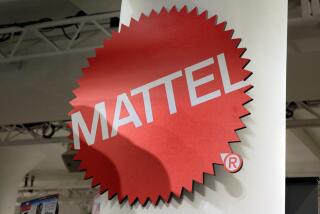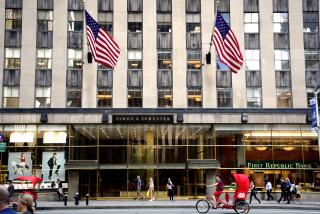Maxwell Rumor Sends McGraw-Hill Stock Up
- Share via
NEW YORK — The stock of McGraw-Hill Inc. spurted Wednesday amid speculation that British media tycoon Robert Maxwell or others might be contemplating an unsolicited takeover of the slumping publishing and information services concern.
McGraw-Hill shares jumped $3.375 a share to $55.50 as longstanding takeover rumors were revived by a broadcast report that Maxwell is preparing a bid of between $65 and $70 a share for the concern. Appearing Tuesday night on Cable News Network, financial columnist Dan Dorfman said Maxwell wants to buy McGraw-Hill’s book division and has discussed the sale of its magazine unit to rival publisher Rupert Murdoch.
Neither McGraw-Hill nor Maxwell would comment on the possibility of a bid, which would probably require between $3 billion and $4 billion. However, a spokesman for Maxwell repeated the publisher’s earlier statements that he is “in the market for the right sort of publishing firm at the right sort of price.”
Trading volume in McGraw-Hill was unusually heavy Wednesday on the New York Stock Exchange, totaling 684,700 shares, compared to a typical 190,000 shares. After an imbalance between buy and sell orders delayed the stock’s opening, the shares traded as high as $58 before pulling back somewhat late in the day. Earlier this week, the stock had gained $2.375 a share Monday and another $1.375 on Tuesday.
McGraw-Hill publishes textbooks; magazines such as Business Week and Engineering News-Record, and, through its Standard & Poor’s and F. W. Dodge units, markets information to the financial and construction industries. The company also owns four television stations, including KGTV in San Diego and KERO-TV in Bakersfield.
Some analysts and traders questioned the accuracy of Dorfman’s report, suggesting that the run-up was caused by short-term speculators who planned to bail out of the stock as soon as the effect of Dorfman’s report faded. They noted that Dorfman’s record in predicting takeovers has not been perfect.
Still, they said the company’s financial problems have given takeover talk new credibility and suggested that the company may indeed be vulnerable to a unfriendly takeover.
Institutional investors have been increasingly unhappy with McGraw-Hill and were disappointed again last week as the company reported fourth-quarter and yearly results. The firm posted 1987 net income of $3.27 a share, or $165.0 million, versus $3.04 a share in 1986. But analysts noted that, excluding a special item, earnings came to $3.05 a share.
“I don’t think the Maxwell story is real, but with earnings like that, someone may come along and try to take them over or force them to do something for the shareholders,” said Peter Appert, analyst with C. J. Lawrence in Manhattan. “Their performance is such that something has to happen.”
McGraw-Hill currently has pretax profit margins of about 9% in the book division, while competitors show 12% to 15% margins, he said. The McGraw-Hill magazine division’s pretax margins have been 14%, versus competitors’ margins “in the high teens”; the broadcast unit’s margins have been about 30%, compared to figures of more than 40% for competitors, according to Appert.
“If it’s not Maxwell, maybe it will be Murdoch or (German publishing firm) Bertelsmann or somebody else,” he said.
Textbook publishing has attracted considerable investor attention in the past several years because of an expected increase in the number of school-age children who will need textbooks. But analysts said the information services, television and magazine units are also desirable and might be resold in a takeover.
“The company seems like a big mouthful for any bidder, but some of the pieces could be easily sold off,” said Bruce Thorp, analyst with Provident National Bank in Philadelphia.
The McGraw family owns a block of more than 18% of the company’s stock, which might be an obstacle to a successful takeover attempt, analysts said. But they said a cash bid with a large premium over the current stock price might overcome that obstacle, as well as the “poison pill” anti-takeover charter provisions that are now in place at the company.
McGraw-Hill’s stock rose sharply last summer when Dorfman reported that corporate raider Irwin L. Jacobs and a partner were accumulating shares of the concern. The pair later sold their stake, and the stock declined.
More to Read
Inside the business of entertainment
The Wide Shot brings you news, analysis and insights on everything from streaming wars to production — and what it all means for the future.
You may occasionally receive promotional content from the Los Angeles Times.











